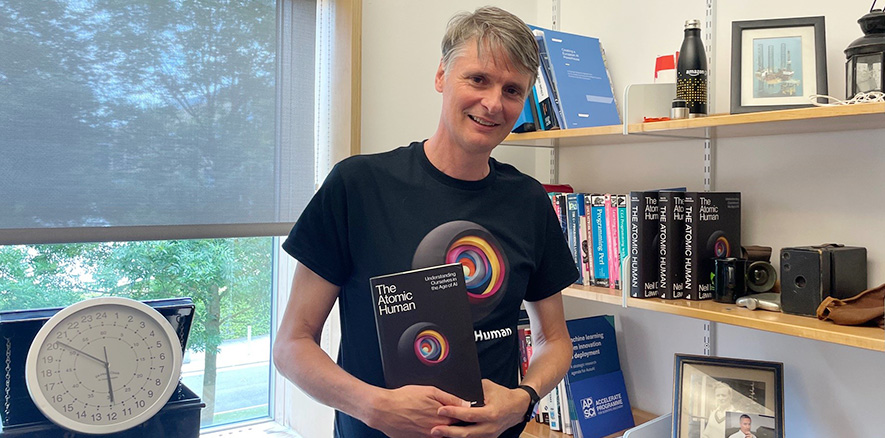
Submitted by Rachel Gardner on Wed, 05/06/2024 - 17:07
The Atomic Human, a new book by our DeepMind Professor of Machine Learning, will try to reset the conversation around artificial intelligence when it is published this week.
Written by Prof Neil Lawrence, who has been working on machine learning models for over 25 years, it explores the question of what artificial intelligence (AI) means for our identity.
As publishers Allen Lane say: "Our fascination with AI stems from the perceived uniqueness of human intelligence. We believe it's what differentiates us. Fears of AI not only concern how it invades our digital lives, but also the implied threat of an intelligence that displaces us from our position at the centre of the world."
The title 'The Atomic Human' derives from the atomic theory of the universe formulated by the Ancient Greek philosopher Democritus. This theory suggested it was impossible to continue dividing matter down into ever smaller components because eventually we reach a point where a cut cannot be made. ('Atom' is the Greek for 'un-cuttable'.)
In his book, Neil proposes that by slicing away at the facets of human intelligence that can be replaced by machines, AI uncovers what is left: an indivisible core that is the essence of humanity.
Neil explains: "The idea behind the term 'the atomic human' is that every time we invent a machine to do something humans do, it’s as though we’re cutting something off what we thought of as uniquely human, raising the question of where does that process stop? The idea is that it does stop – but it stops around our vulnerabilities and our limitations, not our capabilities. So then you're getting to the essence of humanity and you find that humanity is really about how we overcome our limitations. So instead of going around celebrating mega-intelligences, we should be celebrating who we are and trying to understand what we want to be."
He hopes that the book, which is intended for a general rather than a specialised readership, will reset the conversation about AI and refocus it on people.
"The idea is to empower people to have their say and to have 'tech bros' not as the only voice, but as one among the many voices that we need to have engaged in a technology that is going to radically transform the way we all live. It’s absolutely vital that people have their say in how that happens, so this is a book for everyone."
As well as his role as the DeepMind Professor of Machine Learning here, Neil also leads Cambridge University’s flagship mission on AI, ai@cam. He returned to academia in 2019 after three years as Director of Machine Learning at Amazon.
His main interest is the interaction of machine learning with the real world, an interest that was triggered by deploying machine learning in Africa, where 'end-to-end' solutions are normally required. This has inspired new research at the interface of machine learning and systems research, funded by a Senior AI Fellowship from the Alan Turing Institute.
- The Atomic Human - Understanding Ourselves in the Age of AI is published on 6 June by Allen Lane.

